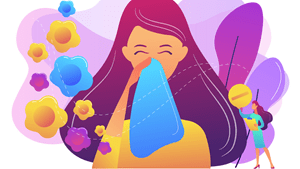
As springtime weather continues to fluctuate in New York State, seasonal allergies are impacting many people. According to the Asthma and Allergy Foundation of America, over 50 million people experience allergies every year.
“Allergies can be caused by seasonal allergens or year-round allergens,” said Shahzad Mustafa, MD, Allergist at Rochester Regional Health. “With the coronavirus still present in our community, it’s important to understand the differences between allergies, the coronavirus, and even the flu.”
Here’s everything you need to know about allergies including symptoms, treatment, and the best time to call your doctor.
Sometimes it can be difficult to decipher whether symptoms are from allergies or an infection. There are a few ways to tell whether you’re sick from a cold, the flu, coronavirus, or just experiencing a bad case of seasonal allergies.
The flu, common cold, and COVID-19 are upper-respiratory infections that show similar symptoms to allergies such as nasal congestion and coughing. However, symptoms like sneezing and itchy eyes won’t be as prevalent in COVID-19 as in allergies.
“A big difference is that allergies will never cause a fever, unlike the coronavirus, flu, or common cold,” Dr. Mustafa said.
Another indication that symptoms may be caused by allergies is the chronicity of them. If symptoms last weeks or months, they are caused by allergies. The common cold and flu usually only present symptoms for up to two weeks.
“There are some overlapping symptoms like congestion, sneezing, and coughing, but they present differently and last for different lengths of time.”
Read more about the differences between the coronavirus and the flu
Seasonal allergens are those that change throughout the year, based on changes in weather. Warm weather causes plants to pollinate and can cause symptoms of allergies. The time of year that people start to feel the effects of seasonal allergies depends on what they’re allergic to.
“Seasonal allergens are trees, grasses, and weeds. Trees pollinate in the spring, grasses pollinate in the summer, and weeds pollinate in late summer or early fall,” explains Dr. Mustafa.
Year-round allergies do not go away with the change in weather. Allergens include pets, dust mites, mold, etc.
Allergies can cause a range of symptoms, including:
“Allergens can also aggravate symptoms of asthma, such as increased coughing and difficulty breathing.”
The amount of time in which seasonal allergies last depends on what you are allergic to.
Most of the time, someone with seasonal allergies is allergic to more than one plant and will experience allergies throughout multiple seasons.
“Depending on what allergens affect you, symptoms can begin as early as spring and continue through October.”
There are ways for people to minimize the symptoms of seasonal allergies without medication or treatment. For example, keeping windows closed during allergy season, leaving your shoes outside, and refraining from hanging laundry to dry outside are all ways you can help prevent getting allergies.
“Decrease the humidity in your home with a dehumidifier. This will keep the air dry and reduce the presence of dust mites,” Dr. Mustafa said.
“I don’t often recommend staying indoors when allergens are prevalent, but if they become overwhelming, that is an option.”
Many medications for allergies are over-the-counter. Antihistamines help reduce sneezing and a runny nose. For nasal congestion, many nasal steroid sprays can be purchased over-the-counter. Other symptoms, like itchy eyes, can be reduced with eye drops.
“If patients find that over-the-counter medications are ineffective at treating their allergy symptoms, there are plenty of prescription medications to treat seasonal allergies.”
Another method to treat allergy symptoms is immunotherapy. Through this process, the immune system can be desensitized to allergens that trigger allergy symptoms.
Immunotherapy can be performed through shots or sublingual immunotherapy.
“Sublingual immunotherapy is an FDA-approved under-the-tongue tablet which can be taken at home. They help reduce symptoms caused by dust mites, grass, and ragweed.”
If your allergies persist regardless of your efforts to stop them, or if you think your allergies are affecting your breathing or triggering asthma issues, get in touch with your doctor.
Allergists can provide skin testing to find out what specific allergens are causing symptoms. They can also provide immunotherapy options for those who want to get rid of symptoms without medications.
“It’s okay to take medicines on your own if they work for you and you’ve spoken to a doctor or pharmacist about them. However, if over-the-counter medications are not working, if you want to know what you’re allergic to, or if you want to try immunotherapy, an allergist can really open up your treatment options.”
When patients come into the office, we screen them before they arrive and before they enter the building. We are screening our staff before they come in, as well. Instead of waiting in the waiting room, patients are being brought right to the exam room. The office is practicing social distancing, everything is being wiped down and disinfected, and we’re limiting the number of people coming in.
Yes, we switched over almost completely to telemedicine. We are starting to see some patients back in the office, depending on their need for in-office treatment or testing. We are here to take care of people in a safe, compassionate way and to provide the care that people need.
A referral is not necessary to make an appointment with our office. You can call and make an appointment whether you’re an established patient or a new patient.
Call (585) 922-8350 to make an appointment with Dr. Mustafa.